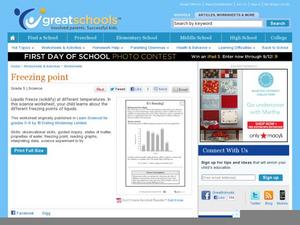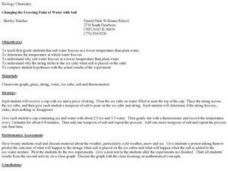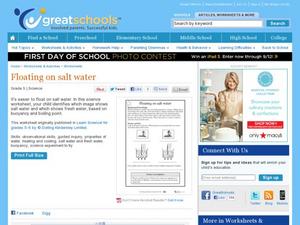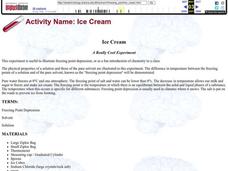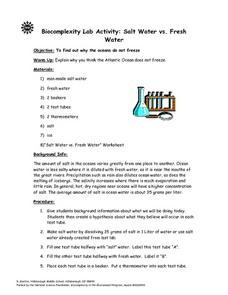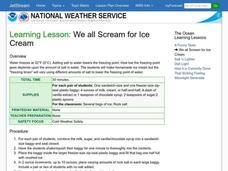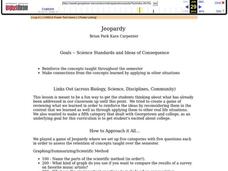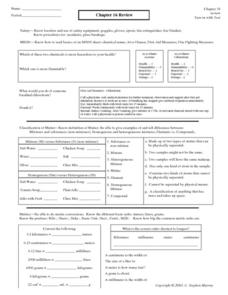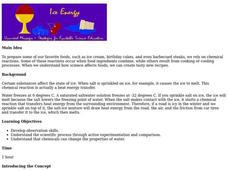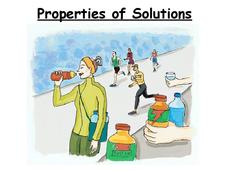LABScI
Freezing Point Depression: Why Don’t Oceans Freeze?
Can you go ice fishing in the ocean? Learners examine the freezing point of different saltwater solutions. Each solution has a different concentration of salt. By comparing the freezing points graphically, they make conclusions about...
Curated OER
It's Freezing!
Here is a good worksheet for 5th grade scientists. In it, they look at a bar graph that shows the freezing point for a variety of liquids. Then, they are given a scenario of a certain liquid melting and freezing, and must determine which...
Curated OER
Properties of Fresh and Sea Water
Students work with three stations to demonstrate the properties of water. They explore water's boiling point, freezing point, and its ability to store heat.
Curated OER
Chillin' Out with Freezing Point Depression
Students examine the freezing point depression of salt water by making ice cream. Lab activity begins with students layering a bowl with ice and salt around an empty cup before adding a mystery solution to the cup. They take the...
American Chemical Society
From Gas to Liquid to Solid
From gas to liquid condensation to solid frost, water undergoes phase changes before students' eyes! Using ice, salt, water, and a metal can, they set up an investigation that can be used in a physical science setting, or as part of a...
Curated OER
Changing the Freezing Point of Water with Salt
First graders explore freezing points. For this science lesson plan, 1st graders determine the temperature at which water freezes, understand why salt water freezes at a lower temperature than plain water, and understand why the string...
Curated OER
Floating on Salt Water
Mixing substances together causes their properties to change. This resource illustrates that concept for fifth graders by having them consider four questions that have to do with buoyancy and boiling point. Learners begin to understand...
Curated OER
Ice Cream
Students are shown an experiment making ice cream while discovering the freezing point depression. There are questions for students to answer after the demostration.
Curated OER
Quick Freeze (Demonstration)
Students witness an demonstration in which a bottle of club soda will go from a liquid to a solid when it is opened and the carbon dioxide is allowed to escape. This will help them understand that the freezing point of a solution will...
Curated OER
Sea Water Freeze
Students observe how salinity affects the time it takes water to freeze. They participate in an experiment to determine that ice is essentially salt-free whether formed from fresh or salt water
Curated OER
Ice Energy
Students explore how chemicals change water. In this chemical change lesson, students participate in an experiment to observe how salt effects ice and how ice cream freezes.
Curated OER
Salt Water vs. Fresh Water
Students explore why the oceans do not freeze. They explain why they think the Atlantic Ocean does not freeze. Students are given background information about what they are doing. They create a hypothesis about what they believe...
Curated OER
Saltwater Science
Students conduct an experiment that shows them how salt water allows things to float. In this salt water lesson plan, students mix ingredients together to create salt water and observe how it makes the oceans dense. They then interpret...
Curated OER
We All Scream for Ice Cream
Students make ice cream while experimenting with the freezing point of water. They experiment with different amounts of salt.
Curated OER
Jeopardy
Learners played a game of Jeopardy where there was five categories with five questions each in order to assess the retention of concepts taught over the semester. The categories included: Graphing/Summarizing/ Scientific Method, Gravity,...
Curated OER
Chapter 16 Review- General Science
In this review of general science worksheet, students classify examples of matter as mixtures or substances, homogeneous or heterogeneous mixtures, or elements or compounds. Students also convert several examples using the standard...
Curated OER
Water Properties of the Great Salt Lake
Fourth graders examine the ecosystem of the Great Salt Lake in this two-part lesson plan, completing a KWL chart before and after the field trip to the site. While there, they draw and write about their observations. To test for...
Curated OER
Melting Ice
Students observe the melting of ice and explore the basic physical changes that occur. They gain information of how different substances change the rate of melting. Students discuss the properties of water and ice, the definition of...
Curated OER
Ice Energy
Young scholars investigate how salt affects the state of ice. In this ice cream making lesson, students change the freezing temperature by adding salt and observing the results. Young scholars use experimentation and comparison to see...
Science Geek
Properties of Solutions
Study the properties of solutions as they relate to mixtures. The slide show presents the key concepts involved with solutions including solvents, solutes, solubility, and electrolytes. Scholars learn the basics of the properties of...
Virginia Department of Education
States of Matter
Scientists have been studying exothermic reactions before they were cool. The lesson begins with a discussion and a demonstration of heat curves. Scholars then determine the heat of fusion of ice and the heat needed to boil water through...
Curated OER
Ice Energy
Young scholars observe the chemical reaction that occurs when salt is put on ice, and use the energy that is released to make ice cream.
Curated OER
Ice Energy
Young scholars study the concept of ice energy. For this ice energy lesson, students observe what happens when salt is sprinkled on a piece of ice before following a recipe to make two types of ice cream. They note the difference in the...
Curated OER
Ice Energy
Students learn how science affects foods. In this chemical reactions lesson, students make two kinds of ice cream. They evaluate the different changes based on the ingredients.



